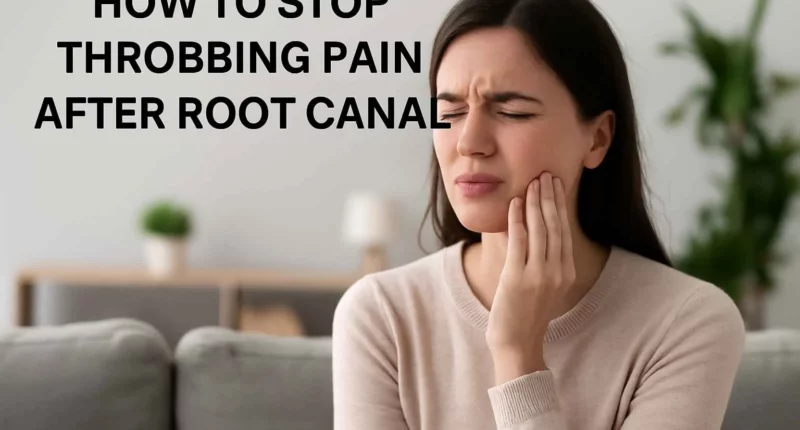Share this @internewscast.com
Have you ever left a root canal thinking the worst was over, only to experience intense, throbbing pain a few days later? While root canals are essential for saving teeth, the lingering discomfort can feel like an unwelcome surprise. It can disrupt your sleep, make eating difficult, and become a constant distraction throughout the day.
If you’re looking for ways to relieve throbbing pain after a root canal, you’ve come to the right spot. This guide provides straightforward, practical solutions to help ease that persistent, pulsing pain.
First, don’t panic—some discomfort is normal. However, if the pain persists or intensifies, there are effective steps you can take. Root canal pain doesn’t have to dominate your life. Let’s explore methods for relief, understand why this pain occurs, and learn how to prevent it from returning.
How to Stop Throbbing Pain After Root Canal Fast: 7 Expert-Backed Ways
Not all root canal pain is created equal. Some soreness is expected. But when it turns into a pounding throb, that’s when you need action.
Here’s how to stop throbbing pain after a root canal, quickly and effectively:
1. Apply a Cold Compress
This one’s easy and works well right after the procedure. Use a cold pack on the outside of your cheek, 10–15 minutes at a time. It slows blood flow to the area, numbs the pain, and reduces swelling. Don’t put ice directly on your skin. Wrap it in a soft cloth.
2. Take Over-the-Counter Pain Relievers
Ibuprofen or acetaminophen can do the trick. Stick with what your dentist suggests. Don’t exceed the dose. These meds reduce inflammation and help with nerve pain, which is what causes that throbbing after root canal work.
3. Elevate Your Head When Sleeping
Try propping up two pillows when you lie down. This keeps blood from pooling around the treated tooth and helps ease pain overnight. Simple change, big difference.
4. Avoid Chewing on the Treated Side
Let the area heal. Don’t use the tooth that has just had work done. Pressure can inflame tissues and worsen the throbbing. Stick to soft foods and chew on the other side of your mouth for a few days.
5. Rinse with Warm Salt Water (Only If Advised)
Some dentists recommend this, especially if there’s swelling. Use ½ teaspoon of salt in warm water. Gently rinse your mouth, don’t swish hard. This helps clean the area and soothe pain. But don’t do it unless your dentist says it’s okay.
6. Use Prescribed Antibiotics if Instructed
If your dentist gave you antibiotics, take them exactly as told. Don’t skip doses. They help fight infection, which is a big reason why pain can get worse. Incomplete antibiotics make things harder to treat later.
7. Call Your Dentist if Pain Persists or Increases
This is key. Throbbing pain that doesn’t ease up within 2–3 days could be a sign that something’s wrong. You might need an adjustment to the bite, another cleaning, or extra meds. Don’t guess, get in touch with your dentist.
Is Throbbing Pain Normal After a Root Canal?
Yes and no. A bit of discomfort? Expected. But pain that won’t let up? That’s another story.
For most people, mild to moderate pain lasts around 2–3 days. For others, it can stretch to a week. That’s still within the healing window. About 40% of patients feel pain within the first 24 hours. By Day 7, that drops to 11%.
But how do you know if your pain is okay or something more?
Normal Pain After a Root Canal:
Warning Signs to Watch:
-
Sharp or severe pain after 3 days
-
Pain that wakes you from sleep
-
Swelling that gets bigger
-
Fever or bad taste in the mouth
If your pain matches the second list, you may have severe pain after root canal treatment. This can be due to infection, poor cleaning during the procedure, or an incomplete root canal.
Pain is your body’s way of saying “something’s off.” If your tooth feels worse on Day 3, it’s time to act. Tooth pain after root canal day 3 isn’t always normal, so don’t wait too long to ask your dentist.
Why Does Throbbing Pain Occur After Root Canal Treatment?
This question bugs most patients. You’ve had the root canal, so shouldn’t the pain stop right there?
Well, not quite. Here’s what’s really going on behind that nagging throbbing:
1. Inflammation of Surrounding Tissues
Your dentist removes infected pulp during the root canal. But the process itself is still invasive. The tissues around the tooth root get irritated, especially at the tip (apex). This causes swelling and tenderness.
2. Tissue Sensitivity
The area may stay sensitive for a few days. Even gentle pressure can cause pain. Think of it like a bruise, just in your jaw.
3. High Bite or Filling Problem
If the filling or crown is a little too high, it can throw off your bite. This means you’re applying more pressure to that spot when chewing, which triggers inflammation and throbbing pain after a root canal.
4. Hidden Infection
Sometimes, a bit of infection remains or returns later. This causes new pain days or weeks after the root canal. You might feel heat or a dull throb that doesn’t stop.
Common Causes and Symptoms of Throbbing Pain After Root Canal
|
Cause |
Description |
Symptom Type |
|
Inflammation |
Normal response to procedure |
Mild to moderate throbbing |
|
Tissue Sensitivity |
Nerve endings are still healing |
Achy pain with pressure |
|
Bite Misalignment |
Filling/crown not seated right |
Pain when chewing or biting |
|
Infection |
Bacterial buildup left behind or returning |
Persistent, sharp pain |
If you’re unsure which cause fits, don’t wait. Go back for a check-up. It’s the only way to avoid future issues.
Pain Timeline Tracker (What’s Normal & What’s Not)
|
Day |
What You Might Feel |
Should You Worry? |
|
Day 1–2 |
Mild to moderate throbbing pain, soreness, tender to chew |
No – Normal post-procedure discomfort |
|
Day 3 |
Slight swelling, dull ache, occasional sharp twinges |
No, but monitor for changes |
|
Day 4–5 |
Pain should be easing. Still sore, but improving |
Mild pain is okay, worsening pain is not |
|
Day 6–7 |
Minimal pain or just sensitivity when biting |
No – Healing well if improving daily |
|
After 1 week |
No pain or very slight sensitivity |
Yes, if throbbing or swelling returns |
|
Beyond 7 days |
Persistent pain, swelling, fever, or bad taste |
Yes – Call your dentist immediately |
How to Prevent Future Pain After a Root Canal
Pain after the root canal can be managed. But stopping it before it starts? Even better. These are smart, real steps you can take:
1. Stick to Your Post-Root Canal Care Tips
Whatever instructions your dentist gave, follow them. From when to take meds to when to eat, it all matters.
2. Don’t Skip the Crown
After your root canal, your dentist may recommend a crown. Get it done. Teeth without pulp become brittle and may crack. That brings pain right back.
3. Adjust Your Bite If Needed
If your bite feels off, even a little, go back and have it adjusted. A high bite keeps pressing the tooth down, triggering pain.
4. Manage Teeth Grinding
If you grind at night, ask your dentist about a mouth guard. Grinding adds pressure on the tooth and worsens throbbing pain after a root canal.
5 . Keep the Tooth Clean
Brush gently and avoid food that sticks in the area. Bacteria in small spaces can build fast.
When to See a Dentist Again
Most people wait too long. Don’t. If pain lingers beyond the first week or worsens after Day 3, get checked.
Tooth pain after root canal day 3 isn’t rare. But if it intensifies or spreads, it could mean infection or nerve issues.
See your dentist if:
-
Pain stays sharp or increases past Day 3
-
You notice pus or swelling in your gums
-
You have trouble chewing or sleeping
-
You get a fever
They might re-check the filling, take an X-ray, or clean out the canal again. You may also need root canal pain relief tips, like prescription meds or an antibiotic round.
Delaying help could turn a simple fix into a second procedure. Don’t wait it out.
Final Thoughts
You got the root canal to end the pain, don’t let recovery pain take over. Healing takes time, but throbbing pain doesn’t have to control your days. Use what works: ice packs, pain relievers, rest, and sleeping with your head raised. These simple steps make a real difference.
Follow your aftercare, protect the tooth, and don’t wait if something feels off. A little discomfort is normal, but constant, pounding pain after Day 3 isn’t. Call your dentist. You don’t have to tough it out. Relief is not just possible, it’s something you can take charge of, starting now.
Related Read: How Long For Deep Filling To Settle Down – Expert Talk!












